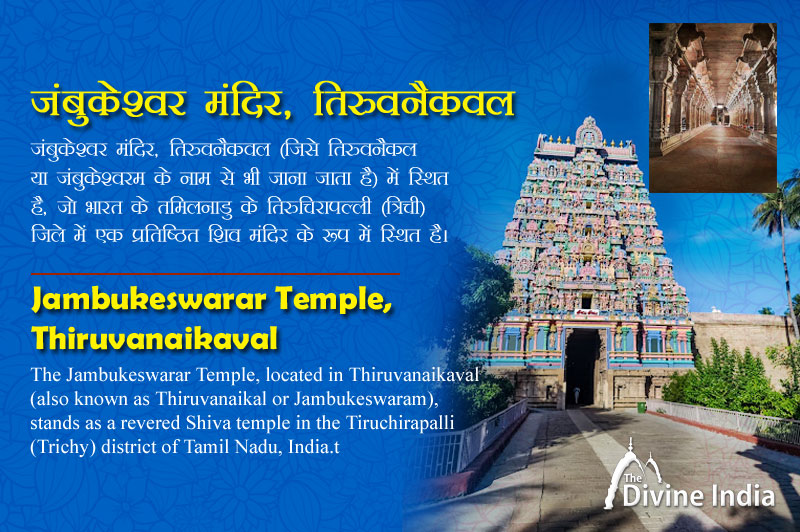


The Jambukeswarar Temple, located in Thiruvanaikaval (also known as Thiruvanaikal or Jambukeswaram), stands as a revered Shiva temple in the Tiruchirapalli (Trichy) district of Tamil Nadu, India. Among the five major Shiva Temples in Tamil Nadu, it holds significance as the representation of Panch Mahābhūta, symbolizing the element of water, known as 'neer' in Tamil.
This sacred site's sanctum dedicated to Jambukeswara is unique for housing an underground stream. As one of the 275 Paadal Petra Sthalams, the temple proudly displays inscriptions dating back to the Chola period, adding to its historical and cultural significance.
With its historical significance and architectural marvels, this temple holds a revered place among devotees and tourists alike.
The term "Pancha Bhoota Sthalam" denotes the five distinguished Shiva temples, with each symbolizing the manifestation of the five primary elements of nature - space, air, fire, water, and earth. "Pancha" signifies five, "Bhoota" refers to elements, and "Sthala" denotes place. These temples, predominantly located in South India, encompass four in Tamil Nadu and one in Andhra Pradesh.
Within these temples, the five elements are believed to reside within the five lingams, with each lingam representing Shiva and holding five distinct names corresponding to the elements they embody. At the Thiruvaanaikaval temple, Shiva is believed to have incarnated as water (Appu Lingam). The other four manifestations are the Prithivi Lingam, symbolizing land, at the Ekambareswarar Temple; the Akasa Lingam, representing sky, at the Thillai Nataraja Temple, Chidambaram; the Agni Lingam, embodying fire, at the Annamalaiyar Temple; and the Vayu Lingam, symbolizing air, at the Srikalahasti Temple.
Dedicated to Lord Shiva, the temple's origins are steeped in mythology. According to legends, Goddess Parvati, in the form of Akilandeswari, performed penance under the Jambu tree in this sacred spot. Impressed by her devotion, Lord Shiva granted her wish to reside there as Jambukeswarar, symbolizing the element of water.
The temple's architecture is a splendid fusion of Dravidian and Vijayanagara styles. The towering gopurams (temple towers) adorned with intricate sculptures and vibrant paintings are a visual delight. The sanctum sanctorum houses the lingam representing Jambukeswarar, submerged in a water-filled pit representing the sanctity of the element.
One of the most striking features is the temple's sacred tank, known as 'Potramarai Kulam.' It is believed that the water in this tank possesses medicinal properties and is used during certain rituals. The temple complex also houses shrines dedicated to various deities like Goddess Akilandeswari, Lord Vinayaka, and Navagrahas (nine planetary deities).
Devotees visit the Jambukeswarar Temple to seek blessings for good health, prosperity, and marital bliss. The temple observes several festivals throughout the year, with Maha Shivaratri being a major celebration. The grandeur of rituals, devotional music, and processions during these festivals attract pilgrims from far and wide.
Beyond its religious significance, the temple fosters a sense of community and spirituality. It serves as a center for religious discourses, cultural activities, and educational initiatives, nurturing values of peace, harmony, and devotion among its visitors.
For tourists and history enthusiasts, the Jambukeswarar Temple offers a glimpse into India's rich heritage. The tranquil ambiance, intricate carvings, and religious fervor create a captivating atmosphere, leaving visitors awestruck and spiritually enriched.
The Jambukeswarar Temple in Thiruvanaikaval stands as a testament to India's cultural legacy, drawing devotees, historians, and tourists seeking spiritual solace and architectural marvels. Its historical significance, architectural grandeur, and spiritual aura make it an indispensable part of Tamil Nadu's cultural tapestry, inviting all to experience its divine charm and timeless allure.